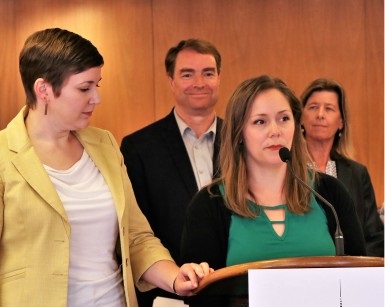San Rafael, CA – The “whatever it takes” approach to addressing homelessness in Marin County is working. By prioritizing the most vulnerable residents for stable supportive housing, the Marin County Department of Health and Human Services (Marin HHS) and its partners have reduced chronic homelessness by 28 percent since 2017 according to preliminary figures from the Point-in-Time Count that took place in January.
 Ashley Hart McIntyre, Marin HHS' Homelessness Policy Analyst, speaks during a May 8 press conference as Homelessness Program Coordinator Carrie Sager (left), Supervisor Damon Connolly and Supervisor Katie Rice look on.
Ashley Hart McIntyre, Marin HHS' Homelessness Policy Analyst, speaks during a May 8 press conference as Homelessness Program Coordinator Carrie Sager (left), Supervisor Damon Connolly and Supervisor Katie Rice look on. Marin HHS released the preliminary results on May 8. The count is mandated by the U.S. Department of Housing and Urban Development (HUD) every two years for every U.S. community that receives federal homelessness funding. On January 28, teams fanned out across Marin to gather data about people experiencing homelessness on a single day. The results are used to understand local needs, track progress toward the goal of ending homelessness, and evaluate homelessness reduction strategies.
Other top takeaways from the Point-in-Time Count:
- Of the 257 people experiencing chronic homelessness, 86 were in emergency shelter the night of the count, meaning there were 171 people experiencing unsheltered chronic homelessness, a 41 percent decrease from the 2017 count. The magnitude of that decrease signals that Marin’s emergency shelters are reaching a more vulnerable population than ever before;
- Family homelessness is down 28 percent;
- Youth homelessness is down 10 percent;
- Homelessness among people with serious mental illness is down 40 percent and down 10 percent among people with substance-use disorders;
- The total count of people experiencing homelessness in Marin is 1,034 individuals, a 7 percent reduction.
The reductions are directly tied to a new system-wide approach that includes adopting a Housing First model, prioritizing the most vulnerable people for housing, sharing data and working collaboratively client by client, and expanding cross-sector partnerships with nonprofits, hospitals, law enforcement, cities, and other partners.
Marin implemented the Housing First approach, an evidence-based practice, because it is the most effective way to address chronic homelessness. Data shows that people who are chronically homeless have a life expectancy 25 years less than their housed peers. Housing First recognizes a person’s housing need first, then surrounds them with support necessary to achieve stability and independence.
“We needed to shift our focus to the most vulnerable, most visible, and most complex population to drastically improve health outcomes,” said Ashley Hart McIntyre, Marin HHS Homelessness Policy Analyst. “We’re thrilled that our preliminary count numbers confirm what studies have shown to be true: Housing highly vulnerable people is the solution to chronic homelessness.”
Since October 2017, Marin HHS and its partners have housed 128 chronically homeless residents, an achievement that has far-reaching impacts. The cost of leaving a chronically homeless person on the street is roughly $60,000 per year because of the high costs of hospitals, the court system, criminal justice and other public systems. The cost of providing permanent supportive housing for people who are chronically homeless is roughly $25,000 per year.
“This achievement would not have been possible without the dedication of our nonprofit partners,” said Carrie Ellen Sager, Marin HHS Homelessness Program Coordinator. “They do the difficult work of implementing these best practices day-to-day and meeting the needs of these complex clients.”
Other new, evidence-based initiatives launched through collaboration between Marin HHS and its nonprofit partners include a shift to housing-focused shelter at Homeward Bound’s Mill Street Center emergency shelter, a diversion program at the St. Vincent de Paul Society of Marin, an Assertive Community Treatment case management team at the Ritter Center.
Three other key contributors to the reduction were:
- The Coordinated Entry program that streamlines participant intake, assessment and referrals;
- The launch of Whole Person Care, a three-year program that uses Medi-Cal dollars to pay for services that relate to all of a person’s health and social needs and allows for data sharing across sectors, facilitating true collaboration between formerly siloed systems; and
- Marin HHS’ partnership with the Marin Housing Authority to provide up to 50 new permanent supportive housing beds per year through the pairing of Section 8 vouchers with Whole Person Care and behavioral health services as well as a housing locator dedicated to recruiting landlords.
Marin General Hospital, which has been partnering with the County’s Whole Person Care program since fall 2017, already has seen the positive impact of stable housing on an individual’s health and wellness.
“It’s often said that housing should be considered a medical vital sign,” said Leigh Burns, RDN, CDE, Manager, PRIME Programs and the Supportive Care Center for Marin General Hospital. “Those with stable housing are more likely to engage in their health care and have better outcomes, and we have already seen tangible evidence of that. We are thrilled to partner with the County and other stakeholders on building a collaborative network that connects medical and social services to deliver better, more coordinated care.”
District 2 County Supervisor Katie Rice, who represents the Ross Valley, serves on the County’s Homelessness Planning Committee.
“These data prove Marin is on the right track,” she said, “and that it is indeed possible to end chronic and veteran homelessness in Marin, which the County and its partners aim to do by the end of 2022.”
The May 8 news conference about homelessness was archived on Facebook.